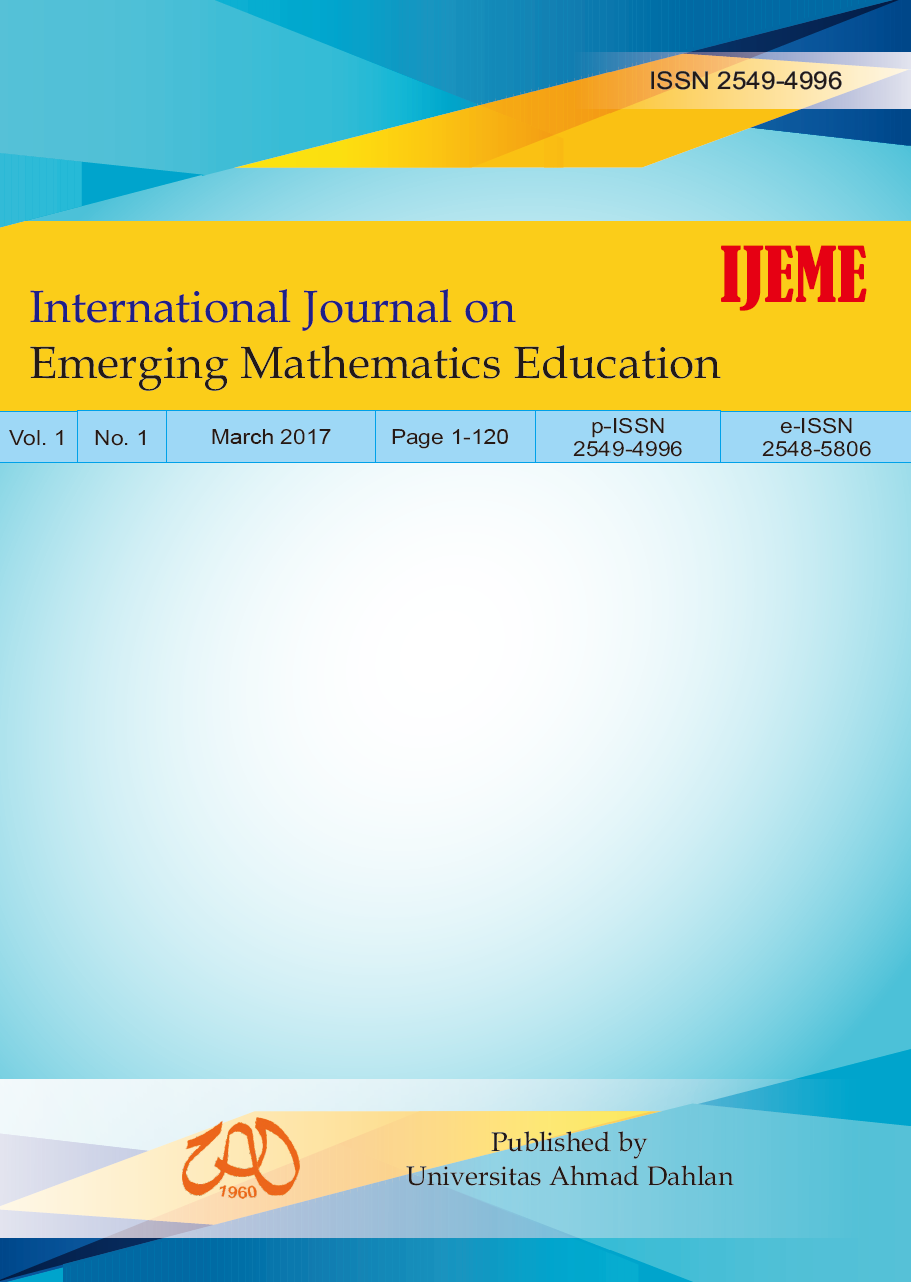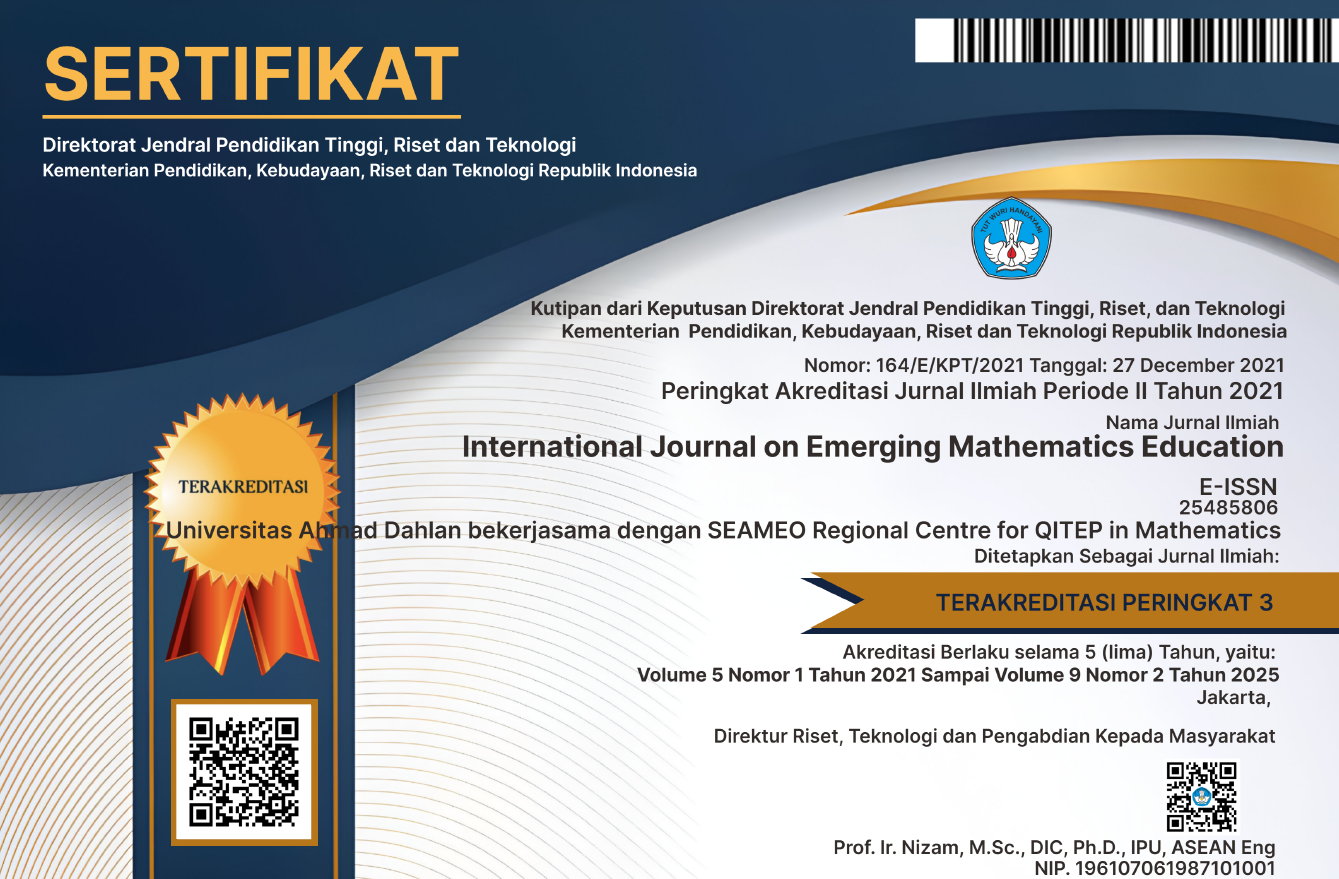Development of Student Worksheets to Improve the Ability of Mathematical Problem Posing
DOI:
https://doi.org/10.12928/ijeme.v1i1.5507Keywords:
student worksheets, scientific approach, what if not strategy, mathematical problem posingAbstract
Activities posing and solving a problem are important parts in mathematics, so the problem posing is an activity that was instrumental in mathematical thinking and become an important part in solving the problem. This type of research is research and development that aims to develop student worksheets through scientific approach with what if not strategy. The research method consists of stages: literature study, observation, interviews, development of student worksheets, assessment of two experts, and restricted trial to the eleventh grade students in SMAN 2 Cimahi, SMAN 3 Cimahi, and SMAN 4 Cimahi. Based on the findings, it was concluded that the student worksheets through scientific approach with what if not strategy load some activities including observing, questioning, trying, reasoning, and concluding. The activity of questioning using what if not strategy involves changing data, adding data, changing data with the same question, or changing question with the same data. The student worksheets also presented some contextual problems in accordance with the experience of students. After tested using worksheet, the improvement of student mathematical problem posing in the three schools was in moderate criteria.
References
Brown, S.I., & Walter, I. (1990). The Art of Problem Posing (2nd ed.). Hillsdale, NJ: Lawrence Erlbaum Associates.
Ellerton, N.F., & Clarkson, P.C. (1996). Language Factor in Mathematics Education. Alphen aanden Rijn: Kluwer Academic Publisher.
English, L.D. (1998). Children's problem posing within formal and informal contexts. Journal for Research in Mathematics Education, 29(1), 83-106.
Herman, T. (2007). Pembelajaran berbasis masalah untuk meningkatkan kemampuan berpikir matematika tingkat tinggi siswa sekolah menengah pertama. Educationist, 1(1), 47-56.
Igor, K. (2016). Considerations of aptness in mathematcial problem posing: students, teacher, and expert working on billiard task. Far East Journal of Mathematical Education, 16(3), 243-260.
Joo, H., & Han, H. (2016). The analysis of middle school students' problem posing type and strategies. The Mathematical Education, 55(1), 73-89.
Kemdikbud. (2013). Pendekatan Scientific (Ilmiah) dalam Pembelajaran. Jakarta: Pusbagprodik.
Kontorovich, I. (2016). Considerations of aptness in mathematcial problem posing: students, teacher, and expert working on billiard task. Far East Journal of Mathematical Education, 16(3), 243-260.
NCTM. (2000). Principles and Standards for School Mathematics. Reston, VA: National Council of Teacher Mathematics.
Silver, E.A. (2013). Problem posing reseach in mathematics education: looking back, looking around, and looking ahead. Educational Studies in Mathematics, 83(1), 157-162.
Sukmadinata, N.S. (2012). Metode Penelitian Pendidikan. Bandung: PT Remaja Rosdakarya.
Sumarmo, U. (2015). Mathematical Problem Posing: Rasional, Pengertian, Pembelajaran, dan Pengukurannya. Retrieved from STKIP Siliwangi: http://utari-sumarmo.dosen.stkipsiliwangi.ac.id/files/2015/09/Problem-Posing-Matematik-Pengertian-dan-Rasional-2015.pdf
Van Harpen, X.Y., & Sriraman, B. (2013). Creativity and mathematical problem posing: an analysis of high school students' mathematical problem posing in China and the USA. Educational Studies in Mathematics, 82(2), 201-221.
Winograd, K. (1997). Ways of sharing student-authored story problems. Teaching Children Mathematics, 4(1), 40-49.
Downloads
Published
How to Cite
Issue
Section
License
License and Copyright Agreement
In submitting the manuscript to the journal, the authors certify that:
- They are authorized by their co-authors to enter into these arrangements.
- The work described has not been formally published before, except in the form of an abstract or as part of a published lecture, review, thesis, or overlay journal. Please also carefully read the International Journal on Emerging Mathematics Education (IJEME) Author Guidelines at http://journal.uad.ac.id/index.php/IJEME/about/submissions#authorGuidelines
- That it is not under consideration for publication elsewhere,
- That its publication has been approved by all the author(s) and by the responsible authorities, tacitly or explicitly, of the institutes where the work has been carried out.
- They secure the right to reproduce any material that has already been published or copyrighted elsewhere.
- They agree to the following license and copyright agreement.
Copyright
Authors who publish with the International Journal on Emerging Mathematics Education (IJEME) agree to the following terms:
- Authors retain copyright and grant the journal the right of first publication with the work simultaneously licensed under a Creative Commons Attribution License (CC BY-SA 4.0) that allows others to share the work with an acknowledgment of the work's authorship and initial publication in this journal.
- Authors are able to enter into separate, additional contractual arrangements for the non-exclusive distribution of the journal's published version of the work (e.g., post it to an institutional repository or publish it in a book), with an acknowledgment of its initial publication in this journal.
- Authors are permitted and encouraged to post their work online (e.g., in institutional repositories or on their website) prior to and during the submission process, as it can lead to productive exchanges, as well as earlier and greater citation of published work.
![]()
Ciptaan disebarluaskan di bawah Lisensi Creative Commons Atribusi-BerbagiSerupa 4.0 Internasional.





